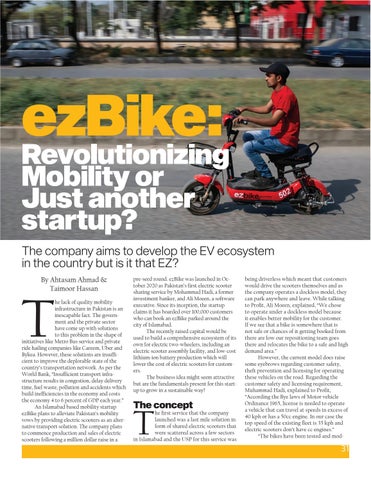ezBike: Revolutionizing Mobility or Just another startup?
The company aims to develop the EV ecosystem in the country but is it that EZ? By Ahtasam Ahmad & Taimoor Hassan
T
he lack of quality mobility infrastructure in Pakistan is an inescapable fact. The government and the private sector have come up with solutions to this problem in the shape of initiatives like Metro Bus service and private ride hailing companies like Careem, Uber and Bykea. However, these solutions are insufficient to improve the deplorable state of the country’s transportation network. As per the World Bank, “Insufficient transport infrastructure results in congestion, delay delivery time, fuel waste, pollution and accidents which build inefficiencies in the economy and costs the economy 4 to 6 percent of GDP each year.” An Islamabad based mobility startup ezBike plans to alleviate Pakistan’s mobility vows by providing electric scooters as an alternative transport solution. The company plans to commence production and sales of electric scooters following a million dollar raise in a
pre-seed round. ezBike was launched in October 2020 as Pakistan’s first electric scooter sharing service by Mohammad Hadi, a former investment banker, and Ali Moeen, a software executive. Since its inception, the startup claims it has boarded over 100,000 customers who can book an ezBike parked around the city of Islamabad. The recently raised capital would be used to build a comprehensive ecosystem of its own for electric two-wheelers, including an electric scooter assembly facility, and low-cost lithium-ion battery production which will lower the cost of electric scooters for customers. The business idea might seem attractive but are the fundamentals present for this startup to grow in a sustainable way?
The concept
T
he first service that the company launched was a last mile solution in form of shared electric scooters that were scattered across a few sectors in Islamabad and the USP for this service was
being driverless which meant that customers would drive the scooters themselves and as the company operates a dockless model, they can park anywhere and leave. While talking to Profit, Ali Moeen, explained, “We chose to operate under a dockless model because it enables better mobility for the customer. If we see that a bike is somewhere that is not safe or chances of it getting booked from there are low our repositioning team goes there and relocates the bike to a safe and high demand area.” However, the current model does raise some eyebrows regarding customer safety, theft prevention and licensing for operating these vehicles on the road. Regarding the customer safety and licensing requirement, Muhammad Hadi, explained to Profit, “According the Bye laws of Motor vehicle Ordinance 1965, license is needed to operate a vehicle that can travel at speeds in excess of 40 kph or has a 50cc engine. In our case the top speed of the existing fleet is 35 kph and electric scooters don’t have cc engines.” “The bikes have been tested and mod-
31







